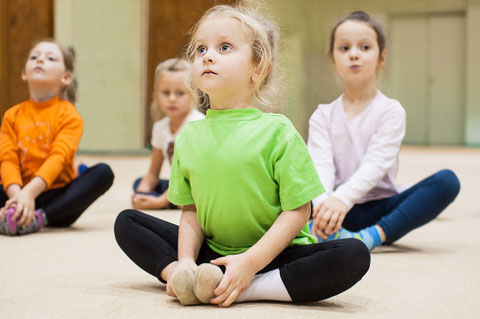Childhood obesity has tripled in just 20 years. Preschool-age children who are inactive risk becoming overweight in the future. The U.S. Surgeon General says daily exercise is a key to being fit. (See Illinois Early Learning and Development Benchmarks 19.A.ECa, 19.B.ECc, 20.A.ECa, and 20.A.ECb.)

What physical activities can you expect preschool-age children to do?
- By age 3, most children can go up and down stairs by alternating their feet, jump in place, throw overhand.
- By age 4, most children can catch a bounced ball, jump with a running start, pedal a tricycle.
- By age 5, most children can skip, leading with one foot, roll like a log, “pump” on a swing.
What can you do at home or in child care to help young children be physically fit?
- Encourage them to get moving. Make positive comments that focus on effort: “Wow, you zoomed down the slide!” “You almost made a basket!”
- Provide at least 60 minutes a day for active free play. Offer riding toys, balls, beanbags, climbers, balance beams, and obstacle courses. Let children pedal, throw, roll, climb, run, skip, dig, and jump in a safe space until they are tired.
- Plan an hour or more of structured physical activity each day. Families and caregivers can teach creative movement, dance, and game-playing skills. Many park districts offer classes in swimming, group games, or ballet for young children. Classes should focus on skills and fun, not winning and losing. In most cases, organized sports are more appropriate for older children.
- Think about safety. Help children remember hats and mittens during cold weather. In hot weather, see that they cool off in the shade and drink plenty of water. Whatever the weather, help them avoid too much exposure to direct sunlight. If a child has asthma or another condition that limits active play, a health care provider can suggest ways to help the child be active and safe.
- Turn off the TV, computer, and electronic games. Limit “screen time” to leave more time for active play. Experts say preschoolers should not sit in one place or lie down for more than an hour at a time unless they are sleeping.
- Set a good example. Let children see you eating healthy food and being active. Note: Doctors say it is better to talk about becoming strong and healthy, rather than about “being thin” or “losing weight.”
- Exercise together. Try sledding, hiking, gardening, and games like catch or tag. Some preschoolers may enjoy a few minutes of playing electronic games that are based on being active together. Stress cooperation and fun rather than winning.
- Share books that show the importance of fitness. Offer children books about dancers, athletes, construction workers, farmers, and other physically active people.


 Printer-friendly PDF
Printer-friendly PDF Printer-friendly PDF
Printer-friendly PDF